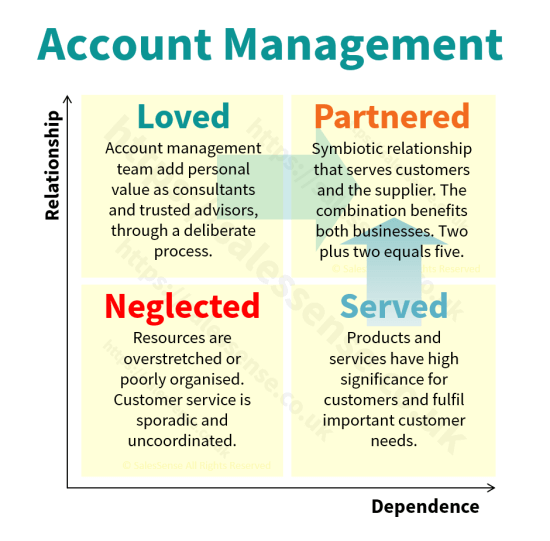Adopt these account manager habits to increase customer retention.

Ensure that important customers aren't seduced by a competitor by establishing a robust customer retention and account management policy.
Repeat business from established customers is much easier and much less expensive to obtain than business from new customers. Studies suggest it is nine times easier to sell to existing customers.
It isn't necessary to do the math to recognise the truth in these statements yet it is so easy to take existing customers for granted. By far the most significant reason given for changing suppliers is poor service.
Key Account Relationships
For larger customers and key accounts, the term ‘relationship’ is apt to be misinterpreted.
Key account managers might maintain good personal relationships with several people in the customer’s organisation, thus creating a warm and fuzzy feeling that everything is alright.
Good relationships may obscure problems. Friendliness can be disconnected from a supplier's standing with a customer.
Being considered a trusted advisor by the most influential people in a customer’s organisation should be the aim of an account manager. How those same people rate the strategic value of a supplier determines the security of a business relationship.
Customer Retention Survey
Imagine an independent survey that asked the most influential people within a customer to rate these two perspectives: On a scale of 1 to 10 with 1 meaning ‘not at all’ and 10 meaning ‘complete agreement’, how would top influencers in your key accounts answer the following two questions?
- To what extent do you consider [supplier name]’s account manager to be a trusted advisor?
- To what extent do you consider [supplier name] to be fulfilling the role of strategic partner?
If you can trust yourself to make an honest estimate of what each important customer contact would say, this simple test might provide an early warning of impending disaster. Simply asking these two questions directly might improve customer retention.
While changing suppliers can be painful it can also have many benefits. New suppliers will work harder for the business, make stronger commitments, and lavish attention at least in the short term. A change in supplier can be used to achieve all manner of change within an organisation that may have otherwise resisted transformation efforts.
Customer retention warrants much more attention than it often receives.
The Role of Account Management in Customer Retention
Customer account managers need to do a lot more than provide a reliable and attentive interface between the respective organisations. Here are a few suggestions:
- Learn the current goals, and objectives of the customer organisation. It is very difficult to think of account managers as being ‘onside’ if they don’t know what the side is aiming for.
- Study the markets that the customer is addressing. Having more than a superficial understanding is necessary to appreciate the declared goals and objectives.
- Understand the strategies being used to guide the accomplishment of important objectives. As for 1, it is difficult for someone to be perceived as a contributor or business partner if it seems that he or she doesn't understand the ‘how’.
- Get to know the dynamics of the customer’s organisation – who is responsible for what and how the organisational landscape is changing. Without an appreciation of the continuous shift in influence and authority, it is difficult to prioritise relationships.
- Pay attention to the aspirations of competitors. Without taking the trouble to identify and monitor warning signs, account managers can find themselves firmly on the back foot reacting to a competitive assault.
- Adopt a systematic approach for covering all aspects of account management. Most key accounts and large customers are complex organisations that soak up supplier resources. Efficient planning and management is critical if mistakes and poor service are to be avoided.
Losing a Key Account
For companies who rely on repeat business from high-value customers, the unexpected loss of an important customer can drastically damage business performance.
Many organisations are on the wrong side of Pareto’s 80/20 law and derive most of their business from just a few customers. Developing a robust customer account management process raises supplier standing, increases sales, and improves customer retention.
Extending this idea, consider defining how all customer relationships are maintained. High numbers of very small customers can be served efficiently by automation. A higher-tier account management definition can define the standard of care for mid-range customers.
“The nicest thing about not planning is that failure comes as a complete surprise and is not preceded by a period of worry and depression”, wrote John Presto.
The same sentiment is expressed by Sun Tzu thus, “Never assume an enemy will not come. Instead, prepare for his coming”.
Article by Clive Miller
If you need to, improve customer retention, sell more to existing customers, or develop customer account manager skills, get in touch. Telephone +44 (0)1392 851500. We will be pleased to discuss your needs or talk through some options. Send an email to custserv@salessense.co.uk for a prompt reply or use the contact form here.












